(Mise à jour pour être en accord avec la nouvelle version de la source de la page) |
|||
| (Une révision intermédiaire par un autre utilisateur non affichée) | |||
| Ligne 1 : | Ligne 1 : | ||
| − | {{ | + | {{Tuto Details |
| − | | | + | |Main_Picture=Chauffe-eau_solaire_DSC00148.JPG |
| − | | | + | |Description=This technology allow to heat water thanks to solar energy |
| − | | | + | |Area=Habitat, Water, Energy |
|Type=Tutorial | |Type=Tutorial | ||
| − | |||
| − | |||
| − | |||
|Difficulty=Medium | |Difficulty=Medium | ||
| + | |Duration=2 | ||
| + | |Duration-type=day(s) | ||
|Cost=40 | |Cost=40 | ||
|Currency=EUR (€) | |Currency=EUR (€) | ||
| − | | | + | |Tags=eau, soleil, chauffer, |
| − | |||
| − | |||
|SourceLanguage=fr | |SourceLanguage=fr | ||
|Language=en | |Language=en | ||
|IsTranslation=1 | |IsTranslation=1 | ||
}} | }} | ||
| − | {{ | + | {{Introduction |
| − | |Introduction=The water heater describe below is inspire by the model present in the SERTA ( service of Alternative Technology) in Brasil | + | |Introduction=The water heater describe below is inspire by the model present in the SERTA ( service of Alternative Technology) in Brasil |
It works perfectly in a tropical or hot climat. It hasn't been tested in a temperate region yet | It works perfectly in a tropical or hot climat. It hasn't been tested in a temperate region yet | ||
}} | }} | ||
| − | {{ | + | {{Materials |
|Material=*Pipe pvc 20mm | |Material=*Pipe pvc 20mm | ||
*Elbow pipe pvc 20mm | *Elbow pipe pvc 20mm | ||
| Ligne 33 : | Ligne 30 : | ||
*Rag | *Rag | ||
}} | }} | ||
| − | {{ | + | {{Tuto Step |
| − | |||
| − | |||
|Step_Title=The way it works | |Step_Title=The way it works | ||
|Step_Content=This system work thanks to a thermal expansion concept | |Step_Content=This system work thanks to a thermal expansion concept | ||
| Ligne 41 : | Ligne 36 : | ||
When the water heat, it fills more space. So it density is weaker dans the cold water one. So, hot water will always be above the cold water. | When the water heat, it fills more space. So it density is weaker dans the cold water one. So, hot water will always be above the cold water. | ||
| − | Explanation of the system: | + | Explanation of the system: |
The water at the bottom of the reservoir (cold) go down by simple gravity until it reach the end of the system. Little by little, at the contact with the hot air confine in the bottle (greenhouse effect), the water get warmer and by consequences go up in the pipe before going back to the reservoir | The water at the bottom of the reservoir (cold) go down by simple gravity until it reach the end of the system. Little by little, at the contact with the hot air confine in the bottle (greenhouse effect), the water get warmer and by consequences go up in the pipe before going back to the reservoir | ||
| + | |Step_Picture_00=Chauffe-eau_solaire_Sans_titre_-_1.jpg | ||
}} | }} | ||
| − | {{ | + | {{Tuto Step |
| − | |||
|Step_Title=Construction of the reservoir | |Step_Title=Construction of the reservoir | ||
|Step_Content=In your reservoir, you will have to make hole for the passage of the pipes | |Step_Content=In your reservoir, you will have to make hole for the passage of the pipes | ||
| Ligne 52 : | Ligne 47 : | ||
If you have a metal reservoir, it is easier to use metal pipe that you will weld. Otherwise, it is also possible to use pvc pipes fixed with cement. | If you have a metal reservoir, it is easier to use metal pipe that you will weld. Otherwise, it is also possible to use pvc pipes fixed with cement. | ||
| − | For a plastic or resin reservoir, the best solution is to use pass-walls. It is also possible with glue or special resin to seal the pipes | + | For a plastic or resin reservoir, the best solution is to use pass-walls. It is also possible with glue or special resin to seal the pipes |
Make : | Make : | ||
| Ligne 60 : | Ligne 55 : | ||
Finally, you could choose between making a hole at the top of your reserve for the inlet of cold water, or simply getting the water by a pipe that you will put on the side of the reservoir. | Finally, you could choose between making a hole at the top of your reserve for the inlet of cold water, or simply getting the water by a pipe that you will put on the side of the reservoir. | ||
| + | |Step_Picture_00=Chauffe-eau_solaire_DSC00154.JPG | ||
}} | }} | ||
| − | {{ | + | {{Tuto Step |
| − | |||
|Step_Title=The heating chamber | |Step_Title=The heating chamber | ||
|Step_Content=The creation of the chamber is very easy : cut the bottom of the bottle in a way that you could slot them together (picture). | |Step_Content=The creation of the chamber is very easy : cut the bottom of the bottle in a way that you could slot them together (picture). | ||
| Ligne 69 : | Ligne 64 : | ||
/!\ Wait before sealing with the adhesive tape ! | /!\ Wait before sealing with the adhesive tape ! | ||
| + | |Step_Picture_00=Chauffe-eau_solaire_DSC00153.JPG | ||
}} | }} | ||
| − | {{ | + | {{Tuto Step |
| − | |||
| − | |||
|Step_Title=Assembly of the lines | |Step_Title=Assembly of the lines | ||
| − | |Step_Content=Start by passing the tubes in the chambers created before, and cutting them in way that when you slot the T in the tube, the neck of the bottle be almost in contact with the T. | + | |Step_Content=Start by passing the tubes in the chambers created before, and cutting them in way that when you slot the T in the tube, the neck of the bottle be almost in contact with the T. |
| − | Stick the T on the tubes (the chamber around the tube) then use adhesive tape to fix the bottle between them, and the necks at the end of the T pipes. | + | Stick the T on the tubes (the chamber around the tube) then use adhesive tape to fix the bottle between them, and the necks at the end of the T pipes. |
A line must be realized with elbow pipe to close the system. | A line must be realized with elbow pipe to close the system. | ||
| Ligne 82 : | Ligne 76 : | ||
How to glue : | How to glue : | ||
| − | + | Frost with sand paper with thin grain the part you have to assembling. | |
Clean it with a rag soak in stripper. | Clean it with a rag soak in stripper. | ||
Apply the glue at the entry of the female part and on the whole male part. | Apply the glue at the entry of the female part and on the whole male part. | ||
| Ligne 89 : | Ligne 83 : | ||
The drying time is about 1h, but if the water is here to be consume, it is advised to wait between 12 and 24 hours for the toxic solvant to disappear. | The drying time is about 1h, but if the water is here to be consume, it is advised to wait between 12 and 24 hours for the toxic solvant to disappear. | ||
| + | |Step_Picture_00=Chauffe-eau_solaire_DSC00152.JPG | ||
| + | |Step_Picture_01=Chauffe-eau_solaire_DSC00149.JPG | ||
}} | }} | ||
| − | {{ | + | {{Tuto Step |
|Step_Title=Assembly | |Step_Title=Assembly | ||
|Step_Content= | |Step_Content= | ||
}} | }} | ||
| − | {{ | + | {{Tuto Step |
| − | |||
|Step_Title=Support | |Step_Title=Support | ||
|Step_Content=Create a shelf (in wood for example) with two lines at different hight, who will form a gentle slope. Only the tubes with the T pipes will be in contact and fixed (here with iron wire) at the frame shelf. | |Step_Content=Create a shelf (in wood for example) with two lines at different hight, who will form a gentle slope. Only the tubes with the T pipes will be in contact and fixed (here with iron wire) at the frame shelf. | ||
The high line must be lower than the bottom of the reservoir ! It is recommended to put the reservoir in high. | The high line must be lower than the bottom of the reservoir ! It is recommended to put the reservoir in high. | ||
| + | |Step_Picture_00=Chauffe-eau_solaire_DSC00158.JPG | ||
}} | }} | ||
| − | {{ | + | {{Tuto Step |
|Step_Title=Connect | |Step_Title=Connect | ||
| − | |Step_Content=Connect with the help of the tubes the line of the T pipe at the bottom to the hole near the bottom of the reservoir and the line of the T pipe of the top to the hole at the middle | + | |Step_Content=Connect with the help of the tubes the line of the T pipe at the bottom to the hole near the bottom of the reservoir and the line of the T pipe of the top to the hole at the middle |
Glue ! | Glue ! | ||
}} | }} | ||
| − | {{ | + | {{Tuto Step |
| − | |||
|Step_Title=More | |Step_Title=More | ||
|Step_Content=You could realize this system with as much heat chambers as you want. | |Step_Content=You could realize this system with as much heat chambers as you want. | ||
| − | The length of the chamber can be modify to, but the more link there will we, the possible heat leak it could be. | + | The length of the chamber can be modify to, but the more link there will we, the possible heat leak it could be. |
You must orientate the system for it to take as much as possible the sun during the day (oriented south). | You must orientate the system for it to take as much as possible the sun during the day (oriented south). | ||
(Other example of production in picture) | (Other example of production in picture) | ||
| + | |Step_Picture_00=Chauffe-eau_solaire_DSC00368.JPG | ||
}} | }} | ||
| − | {{ | + | {{Notes |
|Notes=This system is installed at SERTA (Serviço de Tecnologia Alternativa), Brazil. | |Notes=This system is installed at SERTA (Serviço de Tecnologia Alternativa), Brazil. | ||
[http://www.serta.org.br Serta website] | [http://www.serta.org.br Serta website] | ||
}} | }} | ||
| − | {{ {{ | + | {{PageLang |
| − | |Complete= | + | }} |
| + | {{Tuto Status | ||
| + | |Complete=Published | ||
}} | }} | ||
| + | {{Separator}} | ||
Version actuelle datée du 31 octobre 2019 à 11:00
Description
This technology allow to heat water thanks to solar energy
Sommaire
Sommaire
Introduction
The water heater describe below is inspire by the model present in the SERTA ( service of Alternative Technology) in Brasil
It works perfectly in a tropical or hot climat. It hasn't been tested in a temperate region yet
Matériaux
- Pipe pvc 20mm
- Elbow pipe pvc 20mm
- T pvc 20mm
- Adhesive tape for plumbing
- Plastic bottle
- Reservoir
Outils
- Glue pvc
- Sand paper
- Rag
Étape 1 - The way it works
This system work thanks to a thermal expansion concept
When the water heat, it fills more space. So it density is weaker dans the cold water one. So, hot water will always be above the cold water.
Explanation of the system:
The water at the bottom of the reservoir (cold) go down by simple gravity until it reach the end of the system. Little by little, at the contact with the hot air confine in the bottle (greenhouse effect), the water get warmer and by consequences go up in the pipe before going back to the reservoir
Étape 2 - Construction of the reservoir
In your reservoir, you will have to make hole for the passage of the pipes
If you have a metal reservoir, it is easier to use metal pipe that you will weld. Otherwise, it is also possible to use pvc pipes fixed with cement.
For a plastic or resin reservoir, the best solution is to use pass-walls. It is also possible with glue or special resin to seal the pipes
Make :
- A hole a the bottom of the reservoir for the exit of cold water
- A hole a little bit upper for the arrival of hot water
- An other hole more higher for the exit of hot water, the one you will use.
Finally, you could choose between making a hole at the top of your reserve for the inlet of cold water, or simply getting the water by a pipe that you will put on the side of the reservoir.
Étape 3 - The heating chamber
The creation of the chamber is very easy : cut the bottom of the bottle in a way that you could slot them together (picture).
The more complicated step is to slot at the base of your pile two bottle in the opposite direction, in a way that the edge of the chamber are neck.
/!\ Wait before sealing with the adhesive tape !
Étape 4 - Assembly of the lines
Start by passing the tubes in the chambers created before, and cutting them in way that when you slot the T in the tube, the neck of the bottle be almost in contact with the T.
Stick the T on the tubes (the chamber around the tube) then use adhesive tape to fix the bottle between them, and the necks at the end of the T pipes.
A line must be realized with elbow pipe to close the system.
How to glue :
Frost with sand paper with thin grain the part you have to assembling.
Clean it with a rag soak in stripper. Apply the glue at the entry of the female part and on the whole male part. Slot immediately completely, without twist. Clean the glue drip.
The drying time is about 1h, but if the water is here to be consume, it is advised to wait between 12 and 24 hours for the toxic solvant to disappear.
Étape 5 - Assembly
Étape 6 - Support
Create a shelf (in wood for example) with two lines at different hight, who will form a gentle slope. Only the tubes with the T pipes will be in contact and fixed (here with iron wire) at the frame shelf.
The high line must be lower than the bottom of the reservoir ! It is recommended to put the reservoir in high.
Étape 7 - Connect
Connect with the help of the tubes the line of the T pipe at the bottom to the hole near the bottom of the reservoir and the line of the T pipe of the top to the hole at the middle
Glue !
Étape 8 - More
You could realize this system with as much heat chambers as you want.
The length of the chamber can be modify to, but the more link there will we, the possible heat leak it could be.
You must orientate the system for it to take as much as possible the sun during the day (oriented south).
(Other example of production in picture)
Notes et références
This system is installed at SERTA (Serviço de Tecnologia Alternativa), Brazil.
Published
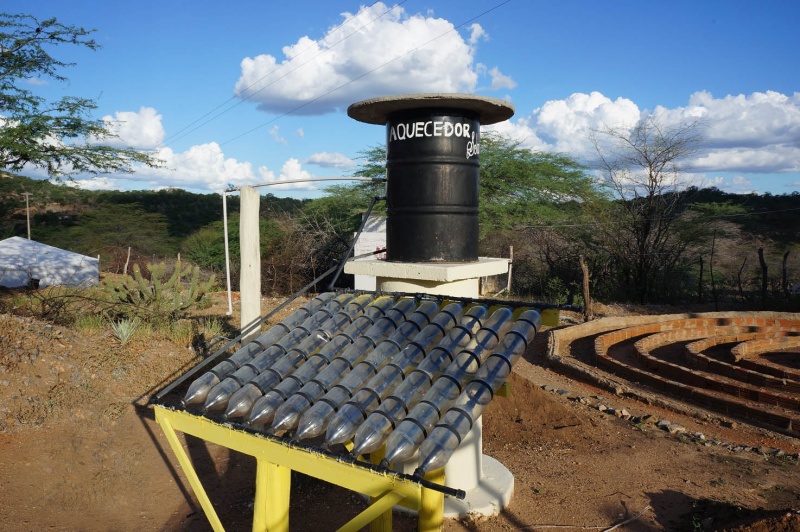
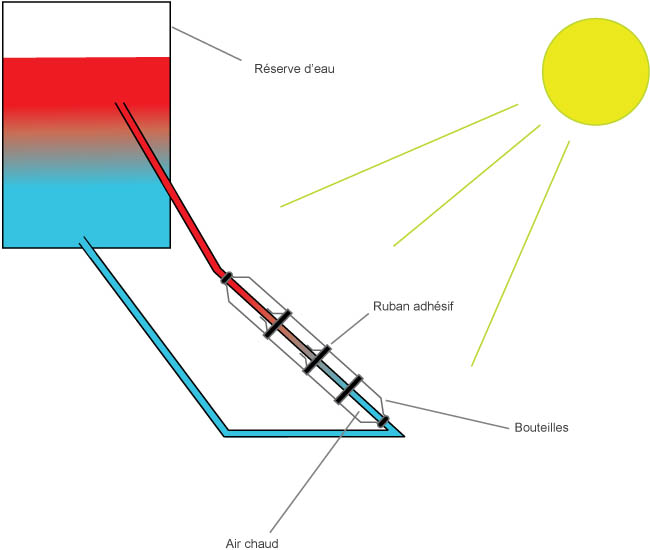
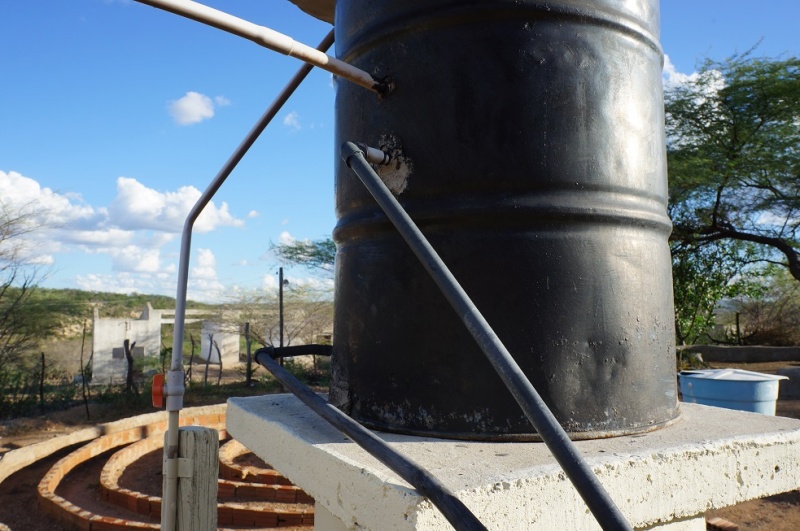
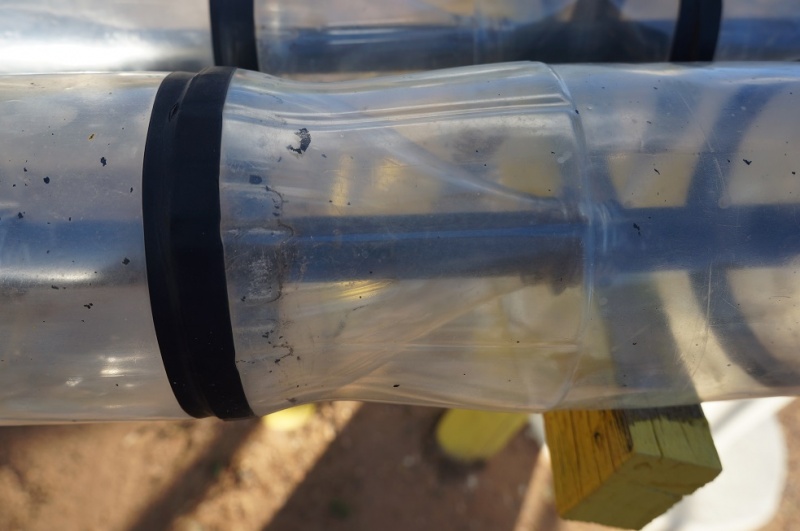
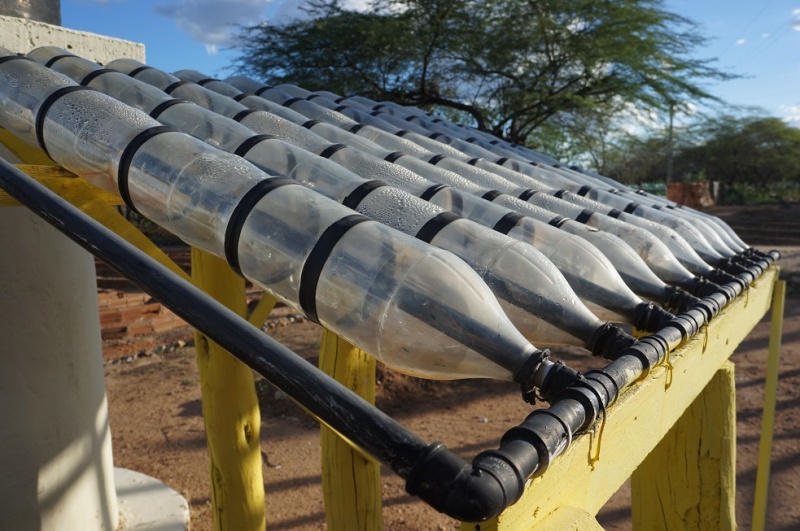
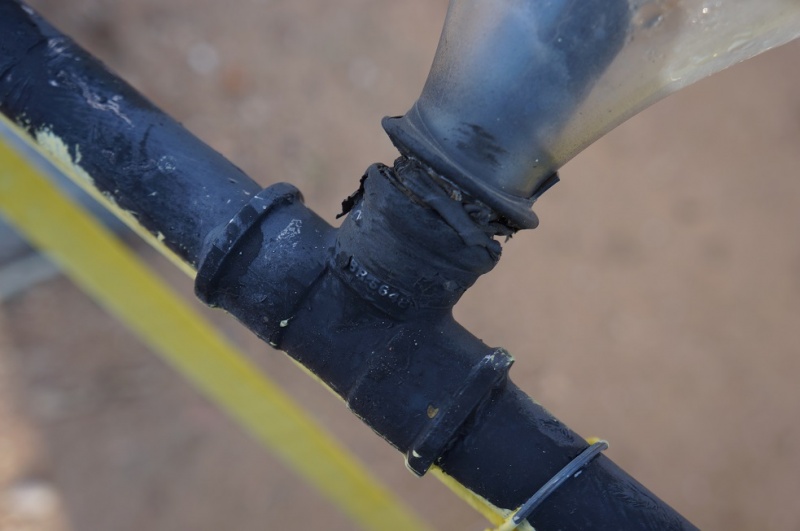
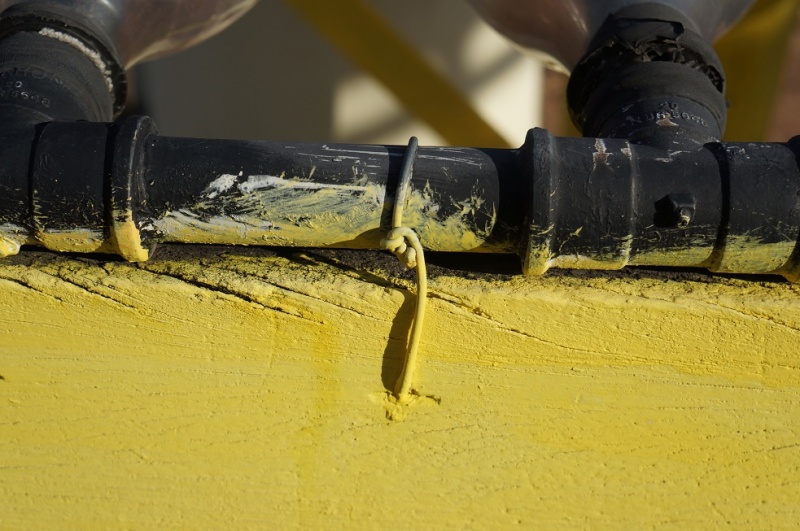
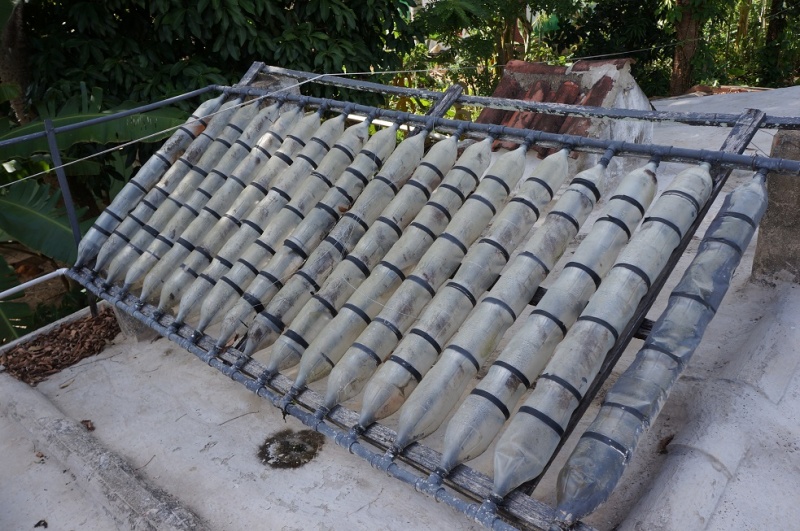
 Français
Français English
English Deutsch
Deutsch Español
Español Italiano
Italiano Português
Português